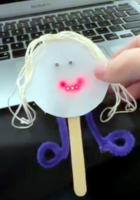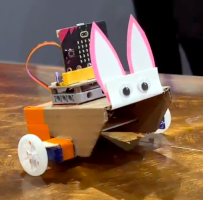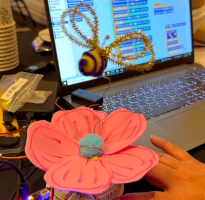Introduction to Physical Computing with MicroBlocks
A workshop led by John Maloney
Sunday, December 8, 2024
10:00 am to noon Eastern Time
via Zoom
Physical computing involves writing programs to interact with the physical world that run on low-cost, battery powered microcontroller boards such as the micro:bit, a credit-card sized computer with built-in sensors and output devices that costs under $20. Created by the BBC to foster interest in STEM, the micro:bit is becoming a popular tool for computing education around the world.
 MicroBlocks is
a free blocks programming language for physical computing that
runs on the micro:bit and other microcontrollers. It supports the
same tinkerability that makes Scratch, Snap!, and Logo so
engaging. Program changes take effect immediately, even while the
program is running, and code snippets or individual blocks can be
clicked to see what they do.
MicroBlocks is
a free blocks programming language for physical computing that
runs on the micro:bit and other microcontrollers. It supports the
same tinkerability that makes Scratch, Snap!, and Logo so
engaging. Program changes take effect immediately, even while the
program is running, and code snippets or individual blocks can be
clicked to see what they do.
MicroBlocks can
be used to make art projects that move and light up, retro games
you can carry in your pocket, or musical instruments. It can be
used to build a crazy vehicle controlled by a Teachable Machine AI
model or to collect data for real science experiments, such as
exploring the effects of weightlessness in the ZeroGee astronaut
training plane.
If you've never done any physical computing, this hands-on
workshop will help you get started. If you are already an expert,
it will give you some new ideas to try.
To fully participate, you'll need a laptop with the Chrome or Edge
browser and a USB port, a micro:bit or other
MicroBlocks-compatible board (see https://wiki.microblocks.fun/en/boards/supported),
and a USB cable to connect the two. Don't have a board yet? No
worries -- you can get started using a virtual board that runs
right in the browser.
 |
 |
 |
